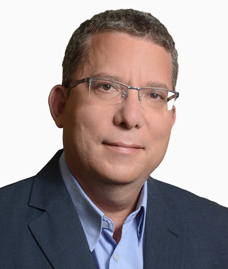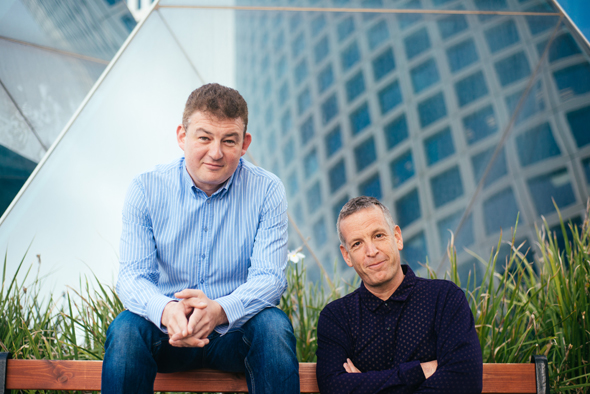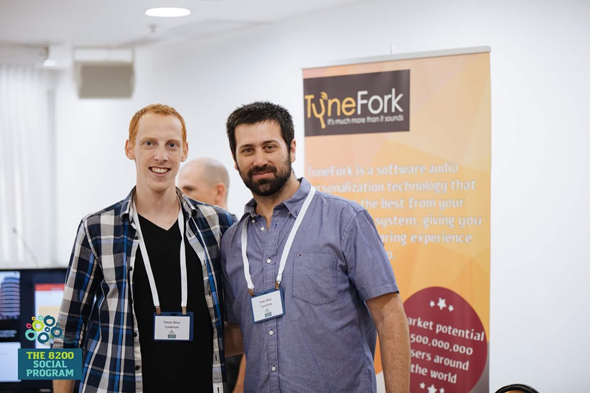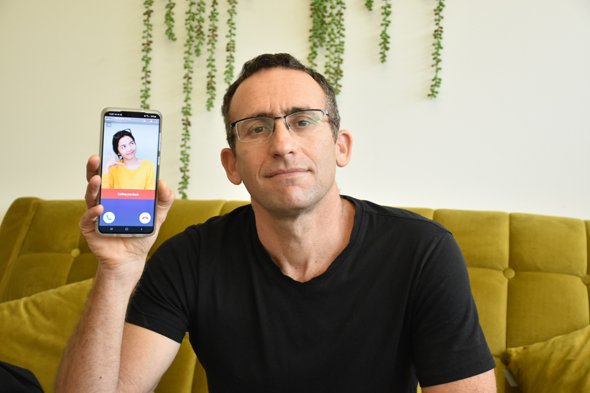Kardome wins the Reinhold Cohn Startup Competition with its better ‘ears’ for robots
2nd and 3rd place winners in the 2021 Reinhold Cohn Startup Competition, in collaboration with Calcalist, are TuneFork and PicUp.
13:4226.01.21
Kardome, which gives voice interactive response systems “better” ears, won first place in the Reinhold Cohn Startup Competition in collaboration with Calcalist. Second place went to TuneFork, which developed advanced technology for customizing and optimizing audio, and third place went to PicUp, which improves service and sales performance through phones.
“Protecting intellectual property is important and desirable for investors at all stages, from seed onward. For us specifically, a consumer-based startup, it was important to protect not only the inventions but also the brand, trademarks and other aspects of the product,” said Ronen Assia, co-founder of the fintech company eToro in a panel at the final event. Mr. Assia stated that they have faced attempts by some to copy their logo, colors, content or UX.
According to Ehud Hausman, Patent Attorney and Senior Partner, Head of the high-tech practice at the Reinhold Cohn Group, software can be protected by patents in many countries around the world, including the U.S, Europe, South Korea, Taiwan and even China. “Startups are misled into thinking their software cannot be protected, because they may find down the road that their competitors do have protection.”
Laly David, Partner and Head of Business Development at OurCrowd, explained that as investors they initially focus on ‘red flags’ and on intellectual property strategy. The company’s intellectual property protection goals and policy are later fleshed out. “Intellectual property is very important at these stages because the company’s future financing, its ability to issue (stocks) and bring in institutional investments is related to being able to protect IP,” she said.
Eran Bareket, Managing Partner of the Reinhold Cohn Group, stated that “Reinhold Cohn’s startup competition was an impressive demonstration of Israeli innovation, which we are proud to have accompanied for 86 years. Over 160 companies submitted their candidacies for the competition. The companies’ presentations gave a look into Israel’s high-tech industry, both in technology and applications, and into the unparalleled ‘vibe’ in Israel. The panels and interviews in the broadcast studio also provided a glimpse into how important it is that tech companies’ intellectual property be properly managed by professionals, to meet the company’s needs and business goals, from its ‘seeding’ to its financial maturing. We thank all the partners for the competition’s success. Along with each of them, we thank the true partners in our success – our dear employees, who bring together professional experience that enables the Reinhold Cohn Group to provide a wide range of services, in all industries and areas of intellectual property – patents, trademarks, designs, copyright and legal advice – in Israel and around the world.”
 Eran Bareket, Managing Partner of the Reinhold Cohn Group. Photo: Eyal Yizhar
Eran Bareket, Managing Partner of the Reinhold Cohn Group. Photo: Eyal Yizhar Improved “machine ears”
“Voice will soon be the dominant interface between humans and machines. Voice-activated personal assistants create new opportunities for different kinds of experiences. From kitchens to cars, malls and airports, voice-activated devices make their way into every conceivable environment. The acoustic complexity of many environments, however, creates demand for improved speech recognition performance. Systems currently operating through voice recognition place the responsibility on the user. In order for these devices to work, you need to avoid background noise, ask others not to speak while the voice command is being given, and so on,” said Dani Cherkassky, Founder and CEO of the competition-winning Kardome.
The technology developed by the company allows voice-activated applications to work “in real life,” with many voices in the surrounding environment. The company has developed software that separates speakers by locating the source of the speech, which allows each speaker to be treated as if he/she were the only one speaking. Kardome’s technology is responding to the growing demand for reliable voice control technology from automakers and electronics manufacturers. The company collaborates with both automakers and Amazon audio engineers, who are responsible for the voice-interactive personal assistant Alexa.
 Kardome founders Dani Cherkassky and Alon Selpak. Photo: PR
Kardome founders Dani Cherkassky and Alon Selpak. Photo: PR Better hearing experience
Tomer Shor, Founder and CEO of TuneFork, said that when looking for a solution for his father, whose hearing was impaired during his military service, they discovered that each person has a unique ‘hearing imprint,’ that hearing is a subjective experience and that today’s hearing aids are not suitable. "We have developed TuneFork, which adapts all audio content to the user’s hearing needs. We have developed a self-hearing test that anyone can perform with a smartphone and standard headphones, and within 5-6 minutes get clinical results. Using the results and smartphone, we produce custom sound including video, audio, music, and speech," he said.
The technology developed by the company for personal audio adjustment is based on clinical studies and improves the quality of life of people with suboptimal hearing loss. Over 1.3 billion people worldwide face hearing problems, making it difficult for them to use smart devices and audio applications (music, movies, video calls, etc.) on a daily basis. TuneFork’s technology creates a personal audio profile that enhances the listening experience and makes it optimal.
 The founders of TuneFork, Yoav Blai and Tomer Shor. Photo: PR
The founders of TuneFork, Yoav Blai and Tomer Shor. Photo: PR Smartphone sales
Organizations invest billions of dollars in optimizing the results from telephone sales of complex products like insurance, loans or mortgages, but telephone sales presents a problem. “When the bank calls me, I do not see who is calling or why. This experience leads to very low trust and poor results. Organizations are losing half of their potential customers at this stage,” said Lior Shacham, CEO and Co-Founder, PicUp. PicUp’s solution is a branded image that the customer receives so that he can decide whether to answer the call. “We are optimizing the message and call screen for the customer at the right time using AI. We have completed a million calls with insurance companies, telecom and banks and increased sales by 60% for their customers,” he said.
Related Stories:
- Israeli biotech company Matricelf wins Calcalist’s StartUp+ competition
- Matricelf, the maker of 3D printed heart, named regional winner of the Startup World Cup
- Hyundai Backs Voice User Interface Startup Kardome
PicUp’s technology adds a smart visual layer in business calls to customers, allowing the end customer to know who is looking for him and why. The technology is embedded in about 10 million devices and serves leading insurance and telecom companies in Europe. The service is currently being launched in Israel.
 Lior Shacham, CEO of PicUp. Photo: PicUp.IO
Lior Shacham, CEO of PicUp. Photo: PicUp.IO
Industrial “eyes” and a rehab robot
Amit Garay, Business Development Manager at CoreTigo, introduced the company’s technology as providing wireless communication solutions for industrial machines on the production floor. The company develops software and hardware for manufacturers of cloud-based machines and software. In the industry 4.0 category, Saccade Vision, a company that developed technology that mimics human vision and includes a camera and software designed for accurate measurements and detection of defects for industrial applications, advanced to the finals.
In the Media & Telecom category, VII Events also qualified for the finals, developing technology for two and three-dimensional virtual events and enabling both virtual and hybrid events. According to Stas Zaslavsky, Director of Business Development and marketing at the company, a virtual event can be produced within 48 hours, but it is recommended to spend at least three weeks doing so.
In the Healthcare & Wellness category, BioXtreme, a company that develops a robotic device for the rehabilitation of neurological victims, competed in the finals. And in the Automotive category, Click-Ins, an AI-based SaaS platform for automatic vehicle damage detection and automation solutions for car and insurance companies in Israel and around the world, also reached the final.
Investing in the riskiest and most disruptive startups
Anya Eldan, VP of Technologies at the Innovation Authority, said that Israel is an innovation stronghold in the world by all standards, which comes from a very large investment in research and development. Forty six percent of Israel’s exports are high-tech, 13% of GDP, but only 9% of the population work in tech. “The Innovation Authority was established with one goal – to use innovation to promote inclusive and sustainable economic success. We use taxpayers’ money for only one purpose and that is to make the Israeli economy successful and prosperous. We do not compete with venture capital funds but want to invest in startups with the most disruptive technology, (the) riskiest,” she said.
The competition was broadcast in a unique virtual studio set up by BY Productions, which has been around for 21 years and produces events for large companies. According to Amir Blecher, CEO of BY, the company was forced to find a new way to broadcast due to the Covid-19 crisis. It ended up setting up the first virtual concert studio in Israel that broadcasts events, shows, games and conferences for large companies, in order to help in maintaining routine and organizational affiliation in an age of social distancing. The event was moderated by Dror Globerman.



